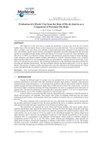氯离子、硫酸盐离子和铵离子对AISI 304不锈钢钝化膜半导体性能和耐蚀性的影响
IF 1.2
4区 材料科学
Q4 MATERIALS SCIENCE, MULTIDISCIPLINARY
引用次数: 0
摘要
水冷却系统通常接受额外的化学处理和不同的特性,以防止不锈钢的点蚀,这取决于介质因素,如物质浓度。氯化物是一种侵蚀性离子,硫酸盐可以作为它的抑制剂。采用循环伏安法、电化学阻抗谱(EIS)和Mott-Schottky图,研究了304不锈钢(304 SS)在含氯、硫酸盐和铵离子溶液中的行为。极化曲线表明,随着铵离子浓度的增加,硫酸盐离子对点蚀的抑制作用和再钝化电位的增加。当氯离子与硫酸盐离子的比例较小(1:2)时,抑制效果最明显。用EIS法测得304 SS样品的电荷转移电阻值与循环伏安法的结果一致,范围在0.4 ~ 0.7 MΩcm2之间。钝化膜表现出半导体行为,符合氧化铬内层和氧化铁外层的模型。形成的钝化膜高度掺杂,掺杂密度值在1020 ~ 21 cm-1之间。腐蚀电位与平带电位之间的差异是在材料不易腐蚀的溶液中发现的。本文章由计算机程序翻译,如有差异,请以英文原文为准。
The effect of chloride, sulfate, and ammonium ions on the semiconducting behavior and corrosion resistance of AISI 304 stainless steel passive film
Water cooling systems usually receive additional chemical treatment and different features to prevent pitting corrosion on stainless steel which is dependent on medium factors such as species concentration. Chloride is an aggressive ion with which sulfate can act as an inhibitor. By applying cyclic voltammetry, electrochemical impedance spectroscopy (EIS), and Mott-Schottky plots, the behavior of 304 stainless steel (304 SS) was evaluated in solutions containing chloride, sulfate and ammonium ions. The polarization curves indicated the inhibiting effect of sulfate ions against pitting corrosion and the increase of the repassivation potential with increasing ammonium concentration. The most pronounced inhibiting effect occurred with a smaller ratio between chloride and sulfate ions (1:2). By EIS, the values obtained for charge transfer resistance of 304 SS sample corroborated the results of the cyclic voltammetry, ranging between 0.4 and 0.7 MΩcm2. The passive film showed semiconductor behavior, in agreement with the model of the chromium oxide inner layer and iron oxide outer layer. The passive films formed were highly doped, with doping density values on the order of 1020-21 cm–1. The difference between the corrosion potential and the flat band potential was found in the solutions where the material was less susceptible to corrosion.
求助全文
通过发布文献求助,成功后即可免费获取论文全文。
去求助
来源期刊

Materia-rio De Janeiro
MATERIALS SCIENCE, MULTIDISCIPLINARY-
CiteScore
1.00
自引率
25.00%
发文量
51
审稿时长
6 weeks
期刊介绍:
All the articles are submitted to a careful peer-reviewing evaluation process by the journal''s Editorial Board. The Editorial Board, reviewers and authors make use of a web based proprietary automated tool to deal with the reviewing procedures.the Revista Matéria''s article reviewing restricted access system - SEER. Authors are not informed about the identity of the reviewers.
 求助内容:
求助内容: 应助结果提醒方式:
应助结果提醒方式:


